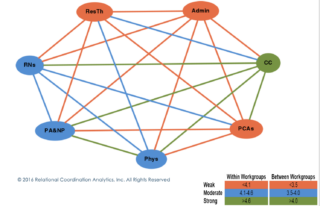If putting new learning to work was a simple technical challenge – codifying it and transferring it – then database solutions might be all we need.
Yet some research has found that 80% of reasons for the failure of improvement projects is due to to emotional, relational and psychological factors, not technical ones (see Baker, Suchman and Rawlins, ‘Hidden in Plain View: Barriers to Quality Improvement’, Physician Leadership Journal, 2016 – available to download).
The Q community has itself always focused on catalysing relationships, for example through our participatory Q Labs and also our UK-wide ‘Randomised Coffee Trials’; randomly generated pairings for serendipitous conversations, that can build new relationships (and sometimes collaborations too). These are available for all Q members now; a chance to take 20 minutes to connect and share your work on COVID-19 or anything else.

The role of ‘Relational Coordination’ in healthcare
Jody Hoffer Gittell (Brandeis U.) has pioneered research into understanding the importance of ‘Relational Coordination’ in healthcare – the key role that such things as shared goals, trust and frequent problem-solving communication play. The strength of this ‘Relational coordination’ predicts everything from clinical outcomes to organisational-level performance.
This framework has been used by Q members including Steve Harrison and Tom Downes (with the Sheffield Microsystem Coaching Academy) and Medical Director Claire Kenwood.
Gittell’s multi-faceted approach includes simple but powerful methods we can use for improving the quality of our connections (where network analysis has identified them as weak), such as facilitating dialogue in pairs using the ‘Conversations of Interdependence” questions:
- What are your primary responsibilities?
- What do you find most meaningful about your work?
- What is it about how I do my work that helps you do yours?
- What could I do differently that would help you even more?
- When does our work seem to be well aligned and when do we seem to be at cross-purposes?
In the midst the tumultuous events of recent weeks, Gittell has also announced the launch of the ‘Relational Society Project’ because “At the root of our challenges are damaged relationships that need to be re-built in a far more inclusive way.”
“At the micro level, we need human empathy, at the meso level we need coordinated collective action, and at the macro level we need supportive institutions”.
Communities from around the globe will be involved, including the NHS North Cumbria region, where Q member Julie Clayton (from Cumbria Learning and Improvement Collaborative) is their contact.
The importance of supporting ‘Bridgers’ in healthcare
Understanding that various different relational roles are needed for successful change is a vital piece of the puzzle: ‘Bridgers’ (or ‘Brokers’) is the label given to those who bring in new knowledge from across boundaries; and ‘Connectors’ sit in high-trust cohesive teams and are in an optimal position to enable local adoption of the novel ideas (discover which of the network roles you are strongest at with this ).
‘Bridgers/Brokers’ are vital if change is seeking to be transformative or divergent, rather than incremental
Research tracking 68 NHS change initiatives found that ‘Bridgers/Brokers’ are vital if change is seeking to be transformative or divergent, rather than incremental. Later research highlighted that these ‘Bridgers’ must have ‘Connectors’ in their network too, to enable the cooperation that gets things done within teams. (Discover which of the 4 main network roles – Broker, Energiser, Connector and Challenger – you play yourself, with a free survey).
A number of Q members are involved in helping to create a first handbook for ‘Systems Convenors’, These are people playing roles such as ‘Bridgers’ and ‘Energisers’ in order to catalyse learning and change across complex landscapes such as healthcare. It will be co-authored by ‘Communities of Practice’ pioneer Etienne Wenger-Trayner. (You can get involved in helping to develop the handbook).
Work on that handbook just predates the pandemic, though COVID-19 itself has prompted notable feats of learning and collaboration. The Coronavirus Tech Handbook was initiated by Newspeak House, a hackspace in East London, and rapidly crowdsourced by thousands of editors and ‘librarians’. And the ‘Oak National Academy’ offering 180 new free online lessons a week, recently announced by the Education Secretary, was created ‘over a week or so’, quite a feat given the usual timelines.
The ‘Network Weaving’ training coming later this year will offer Q members an opportunity to much more deeply understand and optimise their roles, relationships and activity in networks that are seeking to improve health and care and to shift systems. Look out for it.
Do you know which role you play within networks? Share your thoughts on how these relationships can enable learning for improvement in the comments below.